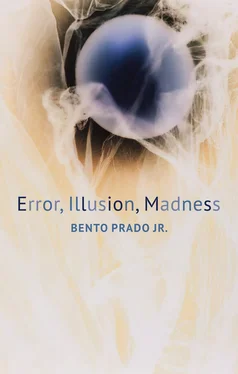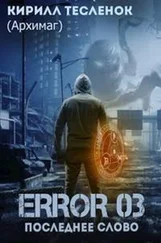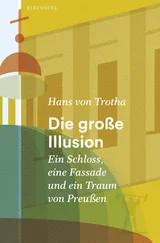That this history of categorial metamorphoses should follow the ramifications of a history of different conceptions of the subject and their functions is no coincidence. For it is the concept of subject itself that allows for thought to be a history of categorial metamorphoses, a process of transformations that result from openness to and obligatory incorporation of the non-identical produced by reflection. This is why one must insist that the contemporary task of recovering the subject is symmetrical to the demand that we understand the systems of reflexive implication that tie it to what produces decentering, and that we understand how these systems insinuate themselves in discourses such as those of modern literature and psychoanalysis.
This decentering, in turn, is the result not just of a recognition by another consciousness, but of the emergence of a ground that does not allow itself to be thought as consciousness. We should note how this strategy led Bento Prado to operate a certain slippage, always present in his texts, which consisted in deliberately associating otherness (which could in principle be something recognizable within my system of rules or language game) and a-normativity (which indicates processes whose apprehension is not subjected to any system of rules). For the otherness that really matters is the one that continuously forces me to come face to face with the limit, to think at the limit, namely in that space where the guarantees of stable control and individuation falter. A thinking capable of being touched by
something like the absolute Other, the human whom I cannot, or no longer can, recognize as a human, the one who speaks a different language, who plays a different game. Or else, which is not too different, the un-world, 4a world not subject to rules, about which we cannot speak. 5
The central tension of the project lies in the demand to speak of an absolute “Other” that is nevertheless constitutive of me—an “Other” that no longer has the form of another consciousness but is nevertheless still capable of contaminating reflection. This apparent paradox led Bento Prado, for instance, to try to discuss, all at the same time, subject, plane of immanence (in its Deleuzian version), transcendental field (in the Sartrean mould), and psychoanalytic unconscious.
In this tension we find what Bento Prado was trying to think through in the experience of ipseity, the theme of his last, posthumously published book. 6The word was chosen in order to avoid the notion of “subjectivity” and its polarity of origin, that between subject and object. But to avoid that polarity does not entail situating his philosophy on the horizon of an affirmation of immanence. Rather it means installing that polarity within the very space of the “oneself.” “What does it mean to be oneself?” is the question that opens the book. Now, whoever asks that question, or even admits that it is a question, that it may indeed be the philosophical question par excellence, will just as well concede that attempting to describe self-reference is far from a self-evident operation.
We know that self-reference requires a language and that this language establishes limits. “I cannot leave myself or my language,” Bento Prado will say. Yet such a proposition can carry the risk of a relativistic drift that would make the plurality of linguistically structured identities into a primordial, insurmountable soil: a multiplicity that is no more than a dispersion of differences across an indifferent exteriority.
Here arises the first of the fundamental questions for a reflection on ipseity— “What would a language of my own be?”—in which one cannot help but hear the echo of a kind of angst that speaks volumes about an intellectual experience situated in Brazil. What does “my own” mean in this case? A language of my own cannot be understood as a private language, a language that lacks a force of generic implication. But to entertain the thought of such a thing as a language of my own necessarily demands that I understand the ipseity presupposed by the possessive pronoun “mine.” Is this “my own” the expression of an ontological certainty about the conditions for elucidating the uses of language and the production of meaning? We should note that it is in fact the critique of this ontological certainty that leads Bento Prado to reject Roberto Schwarz’s belief in critique as a “description of the structures that define in the last instance the field of all possible signification.” 7These structures would in turn ensure the clear intellection of the production of literary signification by unveiling their mechanisms of production, since “the center of gravity of critical interest moves from the work’s manifest face, its visible side or use value, to its schemes of production, the invisible system of coercions that presided over its fabrication.” 8
“What would a language of my own be?,” asks Bento Prado once again. For a critique of language (or a literary critique) that were the “knowledge of the social structures that make consciousness possible and effectively produce it” would still be no more than the movement of consciousness toward itself, a movement charted in the shadow of its ontological certainty. After all, it is not the structures that decenter consciousness, at least not if they appear as an expression of social consciousness. In this case, one is still operating under a fundamental presupposition: “the thesis regarding the continuity between consciousness and knowledge, lived experience and structural knowledge.” 9
Against this view, Bento Prado will say that my own language ought necessarily to be one capable of showing that, as Whitehead put it, “the edges of nature are always ragged.” 10Indeed it is not possible for me ever to leave my language, but it is not necessary that I do so either, because it is always ragged at the edges. Yet what does this beautiful philosophical metaphor of “being ragged at the edges” really mean? First, it implies recognition of a discontinuous articulation between linguistically constituted experience and categorial description. Language touches the world through its groundless ground, in which categorial description discovers the momentum that pushes it to overcome its limits:
It is necessary to stop exactly at this limit where no ground is yet possible. When we believed that we were about to reach the assurance of rock and clay, of Grund , we found ourselves on the edge of the bottomless abyss, the Abgrund . It is not in the clarity of a categorial map (structure, a priori of reason, factual truth of common sense) that false problems can be dissipated and ataraxia attained. 11
This is what the literature that interested Bento Prado talked about. Thus, on the importance of the marsh and the swamp in the fiction of João Guimarães Rosa, he would say:
The marsh is proof that everything is possible in this world, that the most unexpected metamorphoses can convert the good into bad and that each face can all of a sudden be corroded and disfigured by an uncontrollable leprosy. The structure falls apart and all forms change into one another, in unbearable promiscuity. (Living) things attach themselves to one another and contact leaves a definitive stamp on them. 12
In other words, the swamp is like a literary image of the ground as the space in which structure falls apart, all forms change into one another, and what emerges is a background capable of corroding every form, of drowning it in a metamorphic rhythm. This swampy language is ultimately the only one that can be called my own. Thus “language figures here less as a system of signs that allows for communication among subjects than as an ‘element’ or medium, a horizon, the universal soil of all existence and destiny.” 13
Читать дальше












